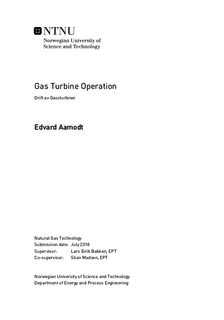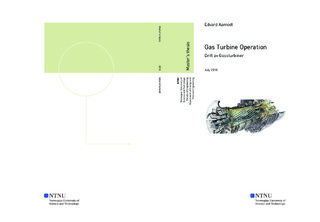| dc.description.abstract | Important power and mechanical drive demands offshore are met by utilizing gas turbines. The safe and reliable operation of these fine-tuned thermo machines are of key importance to maintain platform operation. Problems related to challenging weather conditions and especially ice, are of real concern to engineers. Icing both precipitate and condensate are found to occur in gas turbines, and are only dealt with utilizing anti-icing measures, such as anti-icing systems and filters.
Anti-icing systems mostly used today comes with considerable costs to gas turbine efficiency, and prompts higher emissions to air. An extensive literature study of state-of-the-art anti-icing technologies have been conducted in this thesis. The operational impact the systems have on the gas turbine performance has been mapped. Waste heat recovery method of prevention has been documented to have a relatively small impact on operation. Analysing operational data from two LM2500PE gas turbines offshore confirms this notion. In the analysis the deviation in important performance parameters such as GG speed (N_1), and Pressure Ratio (PR), is more prominent in the gas turbine utilizing hot bleed extraction. The mass flow extraction is believed to be the cause of these deviation on performance parameters. The waste heat recovery system utilizes exhaust gas instead of compressor discharge air, as heat medium, which makes it the preferred system to install.
The hot bleed anti-icing system are documented to impact both compressor and gas turbine efficiencies. The deviations in polytropic compressor and thermal efficiency needs correcting. Correcting these efficiency trends will make diagnosing and detecting malfunctions easier. Polytropic efficiency was found to deviate due to altered N_1c and 〖PR〗_c. Thermal efficiency deviated because compressor delivery temperature (T_3c) was altered. A correction procedure was suggested and it proved promising as polytropic and thermal deviation was reduced from 3% to -1% and 2.4% to 0.4% for baseload, respectively. The part load running machines were corrected from 5.5% to 1% and 4.2% to 1.8% respectively. | |

